4 Books by Herta Müller (Muller)
Requirements: ePUB Reader | 4.4 MB + 753 kB | Version: Retail
Overview: Herta Müller (German: [ˈhɛʁta ˈmʏlɐ] ⓘ; born 17 August 1953) is a Romanian-German novelist, poet, essayist and recipient of the 2009 Nobel Prize in Literature. She was born in Nițchidorf (German: Niczkydorf; Hungarian: Niczkyfalva), Timiș County in Romania; her native language is German. Since the early 1990s, she has been internationally established, and her works have been translated into more than twenty languages.
Müller is noted for her works depicting the effects of violence, cruelty and terror, usually in the setting of the Socialist Republic of Romania under the repressive Nicolae Ceaușescu regime which she has experienced herself. Many of her works are told from the viewpoint of the German minority in Romania and are also a depiction of the modern history of the Germans in the Banat and Transylvania. Her much acclaimed 2009 novel The Hunger Angel (Atemschaukel) portrays the deportation of Romania's German minority to Soviet Gulags during the Soviet occupation of Romania for use as German forced labour.
Müller has received more than twenty awards to date, including the Kleist Prize (1994), the Aristeion Prize (1995), the International Dublin Literary Award (1998) and the Franz Werfel Human Rights Award (2009). On 8 October 2009, the Swedish Academy announced that she had been awarded the Nobel Prize in Literature, describing her as a woman "who, with the concentration of poetry and the frankness of prose, depicts the landscape of the dispossessed".
Genre: Fiction | Historical Fiction.
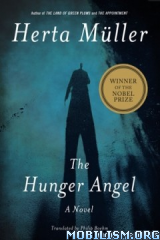
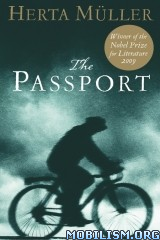
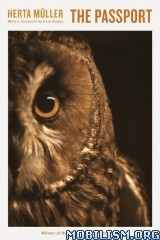
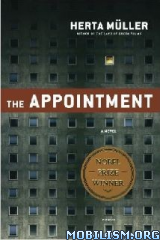
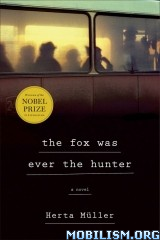
The Hunger Angel:
It was an icy morning in January 1945 when the patrol came for seventeen-year-old Leo Auberg to deport him to a camp in the Soviet Union. Leo would spend the next five years in a coke processing plant, shoveling coal, lugging bricks, mixing mortar, and battling the relentless calculus of hunger that governed the labor colony: one shovel load of coal is worth one gram of bread. In her new novel, Nobel laureate Herta Müller calls upon her unique combination of poetic intensity and dispassionate precision to conjure the distorted world of the labor camp in all its physical and moral absurdity. She has given Leo the language to express the inexpressible, as hunger sharpens his senses into an acuity that is both hallucinatory and profound. In scene after disorienting scene, the most ordinary objects accrue tender poignancy as they acquire new purpose—a gramophone box serves as a suitcase, a handkerchief becomes a talisman, an enormous piece of casing pipe functions as a lovers' trysting place. The heart is reduced to a pump, the breath mechanized to the rhythm of a swinging shovel, and coal, sand, and snow have a will of their own. Hunger becomes an insatiable angel who haunts the camp, but also a bare-knuckled sparring partner, delivering blows that keep Leo feeling the rawest connection to life. Müller has distilled Leo's struggle into words of breathtaking intensity that take us on a journey far beyond the Gulag and into the depths of one man's soul.
The Passport: (UK 2009 Version)(UK 2015 Version with Foreword by PAUL BAILEY)
Just as the father in the house in which we live is our father, so Comrade Nicolae Ceausescu is the father of our country. And just as the mother in the house in which we live is our mother, so Comrade Elena Ceausescu is the mother of our country. Comrade Nicolae Ceasescu is the father of our children. All the children love comrade Nicolae and comrade Elena, because they are their parents.'The Passport is a beautiful, haunting novel whose subject is a German village in Romania caught between the stifling hopelessness of Ceaucescu's dictatorship and the glittering temptations of the West. Stories from the past are woven together with the problems Windisch, the village miller, faces after he applies for permission to migrate to West Germany. Herta Müller describes with poetic attention the dreams and superstitions, conflicts and oppression of a forgotten region, the Banat, in the Danube Plain. In sparse, poetic language, Herta Müller captures the forlorn plight of a trapped people.
The Appointment:
From the winner of the IMPAC Award and the 2009 Nobel Prize in Literature, a fierce and devastating novel about a young woman's discovery of betrayal in the most intimate reaches of her life...
"I've been summoned. Thursday, ten sharp." Thus begins a day in the life of a young factory worker during Ceausescu's totalitarian regime. She has been questioned before; this time, she believes, will be worse. Her crime? Sewing notes into the linings of men's suits bound for Italy. "Marry me," the notes say, with her name and address. Anything to get out of Romania.
As each tram stop brings the young woman closer to the appointment, her thoughts stray to her father and his infidelities; to her friend Lilli, shot trying to flee to Hungary; to her grandparents, deported after her own husband informed on them; and to Paul, her lover, her one source of trust despite his drunkenness. In her distraction, she misses her stop and finds herself on an unfamiliar street. And what she discovers there makes her fear of the interrogation pale by comparison.effects on family and friendship, sex and love.
The Fox Was Ever the Hunter:
Romania-the last months of the Ceausescu regime. Adina is a young schoolteacher. Paul is a musician. Clara works in a wire factory. Pavel is Clara's lover. But one of them works for the secret police and is reporting on all of the group.
One day Adina returns home to discover that her fox fur rug has had its tail cut off. On another occasion it's the hindleg. Then a foreleg. The mutilated fur is a sign that she is being tracked by the secret police-the fox was ever the hunter.
Images of photographic precision combine into a kaleidoscope of terror as Adina and her friends struggle to keep mind and body intact in a world pervaded by complicity and permeated with fear, where it's hard to tell victim from perpetrator.
In The Fox Was Always a Hunter, Herta Müller once again uses language that displays the "concentration of poetry and the frankness of prose"-as the Swedish Academy noted upon awarding her the Nobel Prize-to create a hauntingly cinematic portrayal of the corruption of the soul under totalitarianism.
Download Instructions:
ALL Books
https://dailyuploads.net/2vivlqef0jtw
https://uploadrar.com/gds92weqlb52
The Fox Was Ever the Hunter
https://uploadrar.com/e3aalqlv0aeo
https://dailyuploads.net/qxd9qzoi0abr
Trouble downloading? Read This.
Requirements: ePUB Reader | 4.4 MB + 753 kB | Version: Retail
Overview: Herta Müller (German: [ˈhɛʁta ˈmʏlɐ] ⓘ; born 17 August 1953) is a Romanian-German novelist, poet, essayist and recipient of the 2009 Nobel Prize in Literature. She was born in Nițchidorf (German: Niczkydorf; Hungarian: Niczkyfalva), Timiș County in Romania; her native language is German. Since the early 1990s, she has been internationally established, and her works have been translated into more than twenty languages.
Müller is noted for her works depicting the effects of violence, cruelty and terror, usually in the setting of the Socialist Republic of Romania under the repressive Nicolae Ceaușescu regime which she has experienced herself. Many of her works are told from the viewpoint of the German minority in Romania and are also a depiction of the modern history of the Germans in the Banat and Transylvania. Her much acclaimed 2009 novel The Hunger Angel (Atemschaukel) portrays the deportation of Romania's German minority to Soviet Gulags during the Soviet occupation of Romania for use as German forced labour.
Müller has received more than twenty awards to date, including the Kleist Prize (1994), the Aristeion Prize (1995), the International Dublin Literary Award (1998) and the Franz Werfel Human Rights Award (2009). On 8 October 2009, the Swedish Academy announced that she had been awarded the Nobel Prize in Literature, describing her as a woman "who, with the concentration of poetry and the frankness of prose, depicts the landscape of the dispossessed".
Genre: Fiction | Historical Fiction.





The Hunger Angel:
It was an icy morning in January 1945 when the patrol came for seventeen-year-old Leo Auberg to deport him to a camp in the Soviet Union. Leo would spend the next five years in a coke processing plant, shoveling coal, lugging bricks, mixing mortar, and battling the relentless calculus of hunger that governed the labor colony: one shovel load of coal is worth one gram of bread. In her new novel, Nobel laureate Herta Müller calls upon her unique combination of poetic intensity and dispassionate precision to conjure the distorted world of the labor camp in all its physical and moral absurdity. She has given Leo the language to express the inexpressible, as hunger sharpens his senses into an acuity that is both hallucinatory and profound. In scene after disorienting scene, the most ordinary objects accrue tender poignancy as they acquire new purpose—a gramophone box serves as a suitcase, a handkerchief becomes a talisman, an enormous piece of casing pipe functions as a lovers' trysting place. The heart is reduced to a pump, the breath mechanized to the rhythm of a swinging shovel, and coal, sand, and snow have a will of their own. Hunger becomes an insatiable angel who haunts the camp, but also a bare-knuckled sparring partner, delivering blows that keep Leo feeling the rawest connection to life. Müller has distilled Leo's struggle into words of breathtaking intensity that take us on a journey far beyond the Gulag and into the depths of one man's soul.
The Passport: (UK 2009 Version)(UK 2015 Version with Foreword by PAUL BAILEY)
Just as the father in the house in which we live is our father, so Comrade Nicolae Ceausescu is the father of our country. And just as the mother in the house in which we live is our mother, so Comrade Elena Ceausescu is the mother of our country. Comrade Nicolae Ceasescu is the father of our children. All the children love comrade Nicolae and comrade Elena, because they are their parents.'The Passport is a beautiful, haunting novel whose subject is a German village in Romania caught between the stifling hopelessness of Ceaucescu's dictatorship and the glittering temptations of the West. Stories from the past are woven together with the problems Windisch, the village miller, faces after he applies for permission to migrate to West Germany. Herta Müller describes with poetic attention the dreams and superstitions, conflicts and oppression of a forgotten region, the Banat, in the Danube Plain. In sparse, poetic language, Herta Müller captures the forlorn plight of a trapped people.
The Appointment:
From the winner of the IMPAC Award and the 2009 Nobel Prize in Literature, a fierce and devastating novel about a young woman's discovery of betrayal in the most intimate reaches of her life...
"I've been summoned. Thursday, ten sharp." Thus begins a day in the life of a young factory worker during Ceausescu's totalitarian regime. She has been questioned before; this time, she believes, will be worse. Her crime? Sewing notes into the linings of men's suits bound for Italy. "Marry me," the notes say, with her name and address. Anything to get out of Romania.
As each tram stop brings the young woman closer to the appointment, her thoughts stray to her father and his infidelities; to her friend Lilli, shot trying to flee to Hungary; to her grandparents, deported after her own husband informed on them; and to Paul, her lover, her one source of trust despite his drunkenness. In her distraction, she misses her stop and finds herself on an unfamiliar street. And what she discovers there makes her fear of the interrogation pale by comparison.effects on family and friendship, sex and love.
The Fox Was Ever the Hunter:
Romania-the last months of the Ceausescu regime. Adina is a young schoolteacher. Paul is a musician. Clara works in a wire factory. Pavel is Clara's lover. But one of them works for the secret police and is reporting on all of the group.
One day Adina returns home to discover that her fox fur rug has had its tail cut off. On another occasion it's the hindleg. Then a foreleg. The mutilated fur is a sign that she is being tracked by the secret police-the fox was ever the hunter.
Images of photographic precision combine into a kaleidoscope of terror as Adina and her friends struggle to keep mind and body intact in a world pervaded by complicity and permeated with fear, where it's hard to tell victim from perpetrator.
In The Fox Was Always a Hunter, Herta Müller once again uses language that displays the "concentration of poetry and the frankness of prose"-as the Swedish Academy noted upon awarding her the Nobel Prize-to create a hauntingly cinematic portrayal of the corruption of the soul under totalitarianism.
Download Instructions:
ALL Books
https://dailyuploads.net/2vivlqef0jtw
https://uploadrar.com/gds92weqlb52
The Fox Was Ever the Hunter
https://uploadrar.com/e3aalqlv0aeo
https://dailyuploads.net/qxd9qzoi0abr
Trouble downloading? Read This.
